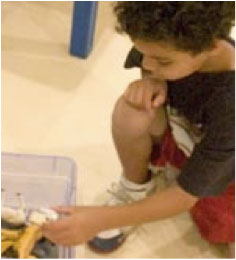Quality Preschool Curricula Program
Pilot Program Shows Ways to Enhance Preschool Quality
Advances in technology and neurobiology have increasingly shown that the foundations of successful learning are laid long before a child starts the first day of kindergarten. Infant and toddler brains undergo rapid and dramatic growth in the first years of life, and that development is dependent on exposure to a variety of experiences.
For some parents and teachers the definition of school readiness is based largely on what a child knows, but entering school ready to learn also incorporates what a child can do. Skills like following simple directions, staying in their seats and developing an interest in learning are equally as important as knowing the ABCs and 123s.
While some children are exposed to the essential building blocks for entering school ready to learn, several studies indicate that low-income children who receive less exposure to quality informal learning opportunities are especially vulnerable to starting school without the basic tools for success. Many of these children who start at a disadvantage are never able to catch up with their peers and are at high risk for dropping out of school.
To help increase the number of children entering kindergarten ready to learn, the Virginia G. Piper Charitable Trust invested nearly $761,000 to pilot a program with the 20 preschools in the Roman Catholic Diocese of Phoenix to evaluate what is working, how the curricula can be improved and potentially standardized, whether the Trust can support staff training and technical assistance, and how the physical learning environments can be improved.



